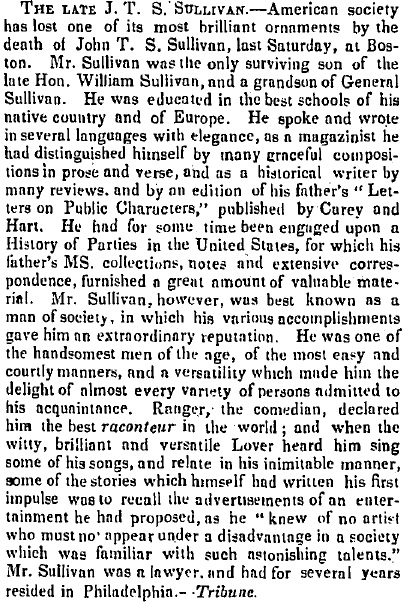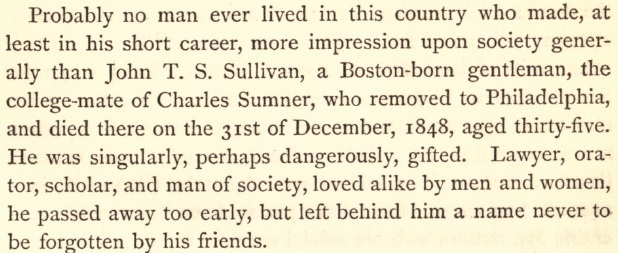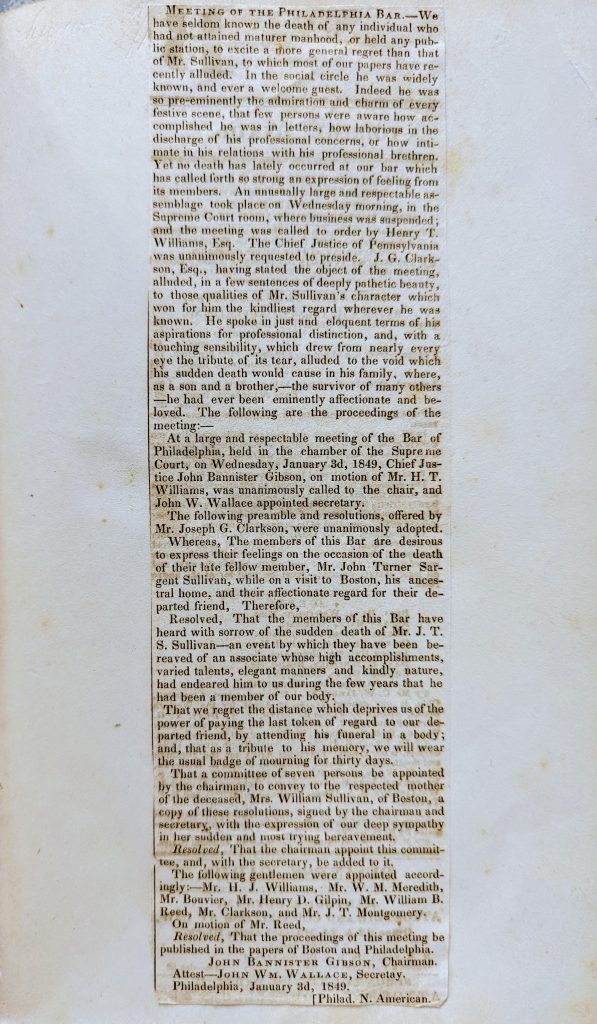The Musical Life of Edgar Allan Poe’s Bankruptcy Lawyer
In writing our article The Purloined Debtor: Edgar Allan Poe’s Bankruptcy in Law and Letters, 34 Yale J. L & Hum. 433 (2023) about Edgar Allan Poe’s bankruptcy (which was just published), my coauthor Erin Sheley and I learned more about a fairly obscure but nonetheless fascinating figure, John Turner Sargent Sullivan. JTSS served as Poe’s attorney and as assignee for Poe’s creditors (more on that later). However, while representing Poe is probably the most interesting fact about his life nowadays, in his time JTSS was a celebrated composer of popular songs and a bon vivant who was well-known in the Philadelphia social scene of the 1840s. When writing the paper I knew I wanted to say more about JTSS than I could in a paper which ultimately wasn’t about him, and this blog post is a perfect opportunity to do just that. For more on Poe’s bankruptcy – read the paper! This post is (mostly) about Sullivan.
A capsule biography of JTSS in The Bench and Bar of The Commonwealth of Massachusetts, published fifty years after his death in 1848, suggest that even long after his death, those who remembered him held his skills in a certain reverence:
JOHN TURNER SARGENT SULLIVAN, son of William, was born in Boston in 1813, and was educated in Germany. He was admitted to the Suffolk bar in October, 1835, and practiced first in St. Louis and afterwards in Philadelphia. He was a superior linguist, a fine musician, an inimitable story teller and excellent conversationalist. The writer knew him well and can say with truth that he has never encountered a man with such varied talents. He died in Boston, December 30, 1848.
Bench and Bar of the Commonwealth of Massachusetts, Volume 1 Pg. 286 (1898)
It isn’t entirely clear who wrote this – the volume is credited to William T. Davis, but Davis was nine years younger than JTSS and was only 26 in 1848, making it unlikely but not impossible he knew him well. Regardless, this tells us a few facts about Sullivan. We know his life fit entirely in Poe’s short life, being born four years later and dying a year earlier. We know he was an attorney and had spent time as a youth in Germany. St. Louis city directories show him practicing at 16 N. 2nd St. there in 1838, while he first appears in Philadelphia city directories in 1841. However, his skills clearly went far beyond the courtroom. An obituary from the time gives more hints as to his character.

A few more details emerge from this – JTSS was the son of the historian William Sullivan, and after his father’s death in 1839 JTSS has stepped in to complete his magnum opus Public Men of the Revolution (this also helps explain why he left St. Louis). His grandfather was James Sullivan, former governor of Massachusetts. However, one final excerpt I think finalizes a specific picture of JTSS.

Before we consider the author of the above some uncultured naïf, John W. Forney had been in Washington and Philadelphia, and spent the period of the Civil War as Secretary of the Senate, a position he received with the help of Abraham Lincoln, and had previously served as Clerk of the House of Representatives – the only man to hold both positions. His book is a catalog of nearly every major figure of mid-19th century America, and JTSS in some ways outshone them all. Perhaps his gifts were not primarily recorded for posterity, indeed Poe’s only recorded comment on JTSS is that he was one of only five or six great “conversationists” he had met.
One of the few areas where JTSS’s legacy was recorded is in music. A number of his compositions have survived, typically songs for voice and piano. In his last few years he was a regular contributor of music and poetry to Godey’s Lady Book. JTSS was educated in Germany before he returned to Boston to attend Harvard, and his exposure to German light opera in the 1820s was something he would draw upon, frequently adapting airs from German compositions alongside new lyrics in English (there was no international copyright law at the time). However, what seems to have been his best-known work was published posthumously, entitled My Southern Home, which indicates he was shown the lyrics a few days before he died, and sung the song to a melody of his invention, which was arranged and published thereafter.
JTSS was a poet as well, and we can see an example – entitled “Solitary Musings,” written in his own hand. He frequently published in Casket (shortly to become Graham’s Magazine), which Poe would assume the editorship of in February of 1841. Interestingly, I could find no record of JTSS being published in Graham’s Magazine during Poe’s tenure as editor (February 1841-April 1842), but was instead published one final time a few months after Poe left. In 1845 he produced a book-length English translation of Heinrich Zschokke’s Alamontade; or, The Galley Slave, which is in multiple libraries but does not seem to have been digitized. This pairs interestingly with JTSS’s thoughts on translations, published posthumously.
So, we have a man of culture and around town in Philadelphia for most of the 1840s. It seems reasonable to think he likely knew Poe socially in advance of Poe’s bankruptcy filing, but it’s not certain. Regarding Sullivan’s practice there are only two reported cases where he is mentioned as counsel. In one case he successfully represented a newspaper which was charged with libel for printing than a lawyer had been stricken from the roll of attorneys. In the other case Sullivan represented himself as assignee in bankruptcy of one Henry Louis, where the federal District Court in Philadelphia held that he could not recover because a previous assignment under state law of the debtor’s property had already been made. Put another way, Poe was not JTSS’s only bankruptcy client, and he had an at least somewhat regular practice under the short-lived 1841 Bankruptcy Act.
Our paper of course goes into this more, but the 1841 Bankruptcy Act was the first modern bankruptcy law, the progenitor of what we refer to today as Chapter 7 Bankruptcy, where a debtor’s assets are liquidated by a trustee and distributed to creditors in return for a fresh start for the debtor. Article 1, Section 8 of the Constitution gives Congress the power to establish uniform laws for bankruptcy, but that power had only been briefly exercised in 1800-1803, in a law which was much more akin to English laws allowing bankruptcy for merchants and traders (there’s also a great timeline of bankruptcy history in the USA here). With the Panic of 1837 calls for a national bankruptcy law became louder, and passing one became part of William Henry Harrison‘s Presidential campaign in 1840. The bankruptcy law was passed August 19, 1841, and repealed about 18 months later on March 3, 1843, although ongoing cases were allowed to continue (to Poe’s relief). A number of relevant documents have been uploaded to understanding bankruptcy in that period, including the local rules and forms which would have been used, and a list of all debtors under the act in Pennsylvania (I’ll take minor credit for convincing the Hagley Museum & Library to upload this)
Meanwhile, Edgar Allan Poe’s financial situation was in dire straits. In July of 1842 he wrote to a friend that
The renewed and hopeless illness of my wife, ill health on my own part, and pecuniary embarrassments, have nearly driven me to distraction. My only hope of relief is the”Bankrupt Act”, of which I shall avail myself as soon as possible. Had I resolved upon this at an earlier day, I might now have been doing well — but the struggle to keep up has, at length, entirely ruined me. I have left myself without even the means of availing myself of the act
EA Poe to James Herron, Jul. 1842 – source
Then as now, bankruptcy could be expensive, and those at the time noted that it frequently generated more money for courts and attorneys than it did for creditors. Although parts of it had previously been posted, I scanned and uploaded the complete bankruptcy case file for Poe, which shows that he was finally able afford JTSS’s services and filed for bankruptcy on December 19, 1842. And that’s where it takes a strange turn.
On January 13, 1843, Oliver Hopkinson, brother of the court clerk for the Eastern District of Pennsylvania, was named commissioner for Poe’s bankruptcy, essentially serving as what we would now call a bankruptcy judge, although with fewer powers. More bizarrely, on that same date JTSS himself was named the assignee for Poe’s creditors – while also serving as Poe’s attorney! Although legal ethics were much murkier then as opposed to now, this feels like it should have set off alarm bells even at the time. The assignee is much the equivalent of a modern Chapter 7 Trustee, which could never be the debtor’s attorney. This isn’t to say that JTSS’s conduct in this case was necessarily unethical – it doesn’t seem Poe had much, although Poe did have some copyright registrations, which were unmentioned for the entire case. It perhaps is of more interesting as a case study – according to a 1846 report creditors received well under 1% of claims in the Eastern District of Pennsylvania under the 1841 Act, one of the lowest recovery rates of any district, and practices like these help explain why.
John Turner Sargent Sullivan died of “disease of brain” while in Boston (perhaps for the holidays visiting family) on December 30, 1848. It seems to have been entirely unexpected, and he was active and vigorous until the end. While working on this project, I was pleasantly surprised to see an original copy of Public Men of the Revolution on sale on eBay for $25, and I ordered it immediately. When I did not expect was this memorial to JTSS pasted into the inside front cover – I can only imagine my copy was once owned by someone who knew him.

Several years after his death, JTSS was mentioned in a court opinion about his mother’s estate. After that he remained a surprisingly strong memory for those who had known him, but largely faded from public consciousness otherwise. Although his music and writings did not endure, he remains a fascinating character, and finding out about him while working on this project was illuminating.





